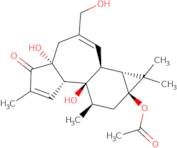Prostratin
CAS: 60857-08-1
Rif. 3D-FP27244
| 1mg | Fuori produzione | ||
| 2mg | Fuori produzione | ||
| 5mg | Fuori produzione | ||
| 10mg | Fuori produzione | ||
| 25mg | Fuori produzione |
Informazioni sul prodotto
- (1aR,1bS,4aR,7aS,7bR,8R,9aS)-9a-(Acetyloxy)-1,1a,1b,4,4a,7a,7b,8,9,9a-decahydro-4a,7b-dihydroxy-3-(hydroxymethyl)-1,1,6,8-tetramethy l-5H-cyclopropa[3,4]benz[1,2-e]azulen-5-one
- (1aR,1bS,4aR,7aS,7bR,8R,9aS)-4a,7b-dihydroxy-3-(hydroxymethyl)-1,1,6,8-tetramethyl-5-oxo-1,1a,1b,4,4a,5,7a,7b,8,9-decahydro-9aH-cyclopropa[3,4]benzo[1,2-e]azulen-9a-yl acetate
- (1bS,4aR)-4a,7b-dihydroxy-3-(hydroxymethyl)-1,1,6,8-tetramethyl-5-oxo-1,1a,1b,4,4a,5,7a,7b,8,9-decahydro-9aH-cyclopropa[3,4]benzo[1,2-e]azulen-9a-yl acetate
- (1bS,4aR,7aS,7bR,8R)-4a,7b-dihydroxy-3-(hydroxymethyl)-1,1,6,8-tetramethyl-5-oxo-1,1a,1b,4,4a,5,7a,7b,8,9-decahydro-9aH-cyclopropa[3,4]benzo[1,2-e]azulen-9a-yl acetate
- 12-Deoxyphorbol 13-acetate
- 13-O-Acetyl-12-deoxyphorbol
- 5H-Cyclopropa[3,4]benz[1,2-e]azulen-5-one, 9a-(acetyloxy)-1,1a,1b,4,4a,7a,7b,8,9,9a-decahydro-4a,7b-dihydroxy-3-(hydroxymethyl)-1,1,6,8-tetramethyl-, (1aR,1bS,4aR,7aS,7bR,8R,9aS)-
- 5H-Cyclopropa[3,4]benz[1,2-e]azulen-5-one, 9a-(acetyloxy)-1,1a,1b,4,4a,7a,7b,8,9,9a-decahydro-4a,7b-dihydroxy-3-(hydroxymethyl)-1,1,6,8-tetramethyl-, [1aR-(1aα,1bβ,4aβ,7aα,7bα,8α,9aα)]-
- K 101A
- NSC 623310
- Vedi altri sinonimi
- Sa 101A
- Stillingia factor S<sub>7</sub>
- Stillingia factor S7
- (1aR,1bS,4aR,7aS,7bR,8R,9aS)-9a-(Acetyloxy)-1,1a,1b,4,4a,7a,7b,8,9,9a-decahydro-4a,7b-dihydroxy-3-(hydroxymethyl)-1,1,6,8-tetramethyl-5H-cyclopropa[3,4]benz[1,2-e]azulen-5-one
Prostratin is a natural product that has been shown to be an effective treatment for HIV-1. It inhibits the signaling pathways that activate the immune system and prevents HIV-1 from replicating. Prostratin also has minimal toxicity in humans, with no significant adverse effects on the heart or liver. Prostratin is derived from jatrophane diterpenes, which are found in plants such as Jatropha curcas. These compounds have been shown to have anti-inflammatory properties and may be a potential biomarker for bowel disease. Prostratin binds to toll-like receptor 4 (TLR4), which activates the protein kinase C pathway, leading to a decrease in viral life and increased apoptosis of infected cells. This drug also has molecular pathogenesis properties and can inhibit protein synthesis by blocking transcription at the polymerase chain reaction stage of gene expression.





